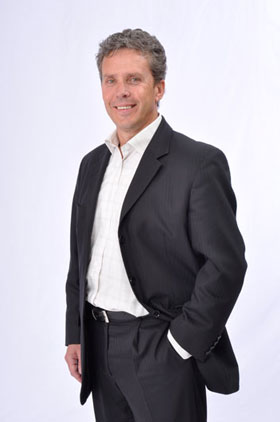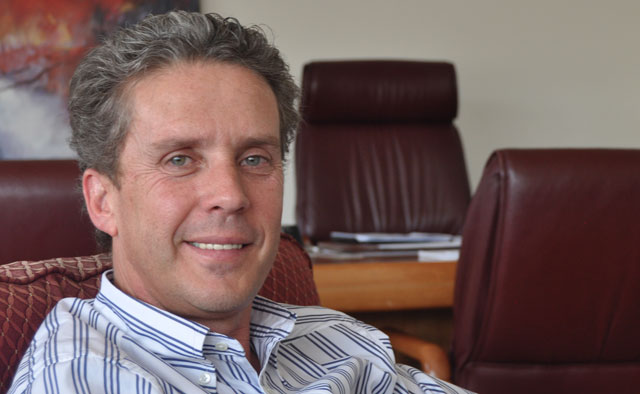 Brazilian-born Pete da Silva spent the first 20 years of his working life at the Southern African subsidiary of German industrial and telecommunications giant Siemens, climbing the corporate ladder from trainee technician when he started to group CEO when he resigned in 2007 to pursue his passion for motorsport.
Brazilian-born Pete da Silva spent the first 20 years of his working life at the Southern African subsidiary of German industrial and telecommunications giant Siemens, climbing the corporate ladder from trainee technician when he started to group CEO when he resigned in 2007 to pursue his passion for motorsport.
Now, after a nearly three-year stint setting up and running the now-defunct A1 Grand Prix series, Da Silva is back in SA running JSE-listed technology group Jasco.
“I had reached a glass ceiling at Siemens,” Da Silva tells me in his comfortable office in Jasco’s building next to the busy highway in Midrand. “I had to ask where I went from there. One option was to go to the Munich head office, but I had two teenage boys who couldn’t speak a word of German. It was a bridge too far.”
Da Silva says he had a choice: either he dedicated the rest of his life to Siemens or he pursued something entirely different. “If you talk to Cell C or Vodacom or Eskom, they saw me as ‘Mr Siemens’. I couldn’t exactly come back as Mr ZTE or Mr Honeywell.”
With a life-long passion for motor racing, Da Silva accepted an offer to take the reins at the family-run A1GP. The family that controlled the motorsport series had been pursuing him while he was still at Siemens. “I wanted to respect my restraint and Siemens was not in motor racing, so it sounded like a nice gap.”
He had intended to head up A1GP for only two years, but ended up staying for three. However, the pressures of flying all over the world and running a multinational business took their toll. “I had visions of [Formula One CEO] Bernie Ecclestone at 80. The guy is going to have a heart attack on the grid.”
Da Silva says running A1GP was a tough life, especially given he has a wife and two children in SA. “I used to wake up in China, look out the window, and wonder where I was,” he says. “It was crazy, although it was rewarding to watch the business develop, even after it suffered serious constraints after the world economic downturn.”
A1GP was liquidated in 2009, a year after Da Silva tendered his resignation. “It was essential to have a big investor to come in to corporatise A1GP,” he says. That didn’t happen after the family trust that controlled it ruled it out. This, Da Silva suggests, was key to its unravelling.
On returning to SA, Da Silva made a pledge that he would not go back into the corporate world on a full-time basis. Instead, he took up various directorships, including one on the board of Community Investment Holdings (CIH), which had a stake in Jasco and a range of companies in the technology, logistics, mining, financial services and healthcare industries.
It was there that he was asked by CIH chair Anna Mokgokong — who had also served as deputy chairman of Siemens Southern Africa — to become more involved in turning around Jasco, which had recently bought JSE-listed telecoms specialist Spescom. He was appointed as a nonexecutive on Jasco’s board.
“We decided to see what we could do with this company that was formed in 1976 and that listed in the 1980s but which wasn’t creating much bulk,” he says.

“There was a bit of a lack of direction at Jasco and we decided we needed to bulk it up and set up a complete strategy, so much so that I was soon asked to take over the business.”
He took the reins in May 2011 and set about restructuring the company. “Jasco was a company of brands that were not well recognised,” he says. “We’ve changed it from a company of brands to a branded company.”
That involved significant rationalisation, closing down and merging myriad subsidiary companies to create three “vertical” divisions — ICT solutions, industry solutions and energy solutions – and encouraging the new divisions to cross-sell products and services more effectively.
Da Silva also wants to develop stronger annuity revenues rather than being seen mainly as a “box dropper”. Jasco’s recent acquisition of Arc Telecommunications from Alan Knott-Craig Jr’s World of Avatar was in line with this strategy. “We used to connect PABXes and call centres and walk away. Now, with the acquisition of Arc, we can plug in a 2Mbit/s pipe behind that and give clients one bill and one person to complain to and we get some good annuity revenue.”
The company will consider other acquisitions to bolster its business, though Da Silva says these will be “small, bolt-on deals”.
“Spescom was a large acquisition. With our balance sheet we can’t do that every year, so we’re doing smaller acquisitions we can digest,” he says.
“What I like about this business is it’s an SA company. At Siemens, I had to go to Munich [with a proposal] and Munich would decide,” Da Silva says. “Here, we have the accountability and the freedom to do what we need to.”
He describes his role at Jasco as building the business to a “sustainable level”. He hasn’t given himself a set deadline to do that. “I’m here as long as it takes.”
Born in Rio de Janeiro, Da Silva, who studied mechanical/light current engineering and who has a Siemens internal MBA through Duke University, moved to SA with his parents in the 1960s. He completed his education in SA, although his parents, dissatisfied with the country’s political situation, left for Europe in the 1980s. Forced by the SA government to become a citizen, he received his call-up papers into the apartheid-era defence force. He was dead set against the idea and, with the help of Siemens, managed to dodge the conscription bullet.
“We never wanted to leave the country,” he says. “We always had a vision it would work.”
Despite no longer being directly involved, Da Silva says he retains all of his passion for motorsport. He’s glued to his television on Sundays when Formula 1 races are on.
Surprisingly, he drives a relatively sedate car — a Range Rover — for someone who loves motor racing. “If I had my choice, it would be a nice little Porsche, but I can’t fit the family in one of those,” he says.
As the interview is wrapping up, he also tells me about his love of motorcycling, though he sold his prized Ducati a year ago. “My brain and my body aren’t in sync anymore,” he says. “I guess I’m getting too old to drive a machine like that, so I had to get rid of it.” — (c) 2012 NewsCentral Media

